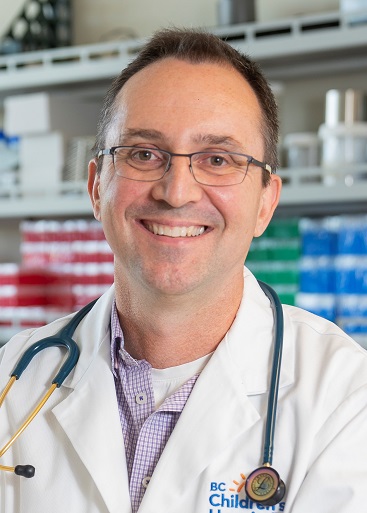
Tell us about the current work you’re doing related to precision health.
My research focuses on two major health problems that are informed by clinical realities and that have immune system dysfunction as key to their pathogenesis:
- Asthma: The most common chronic non-communcable disease of childhood; and
- Primary immunodeficiency diseases: Devastating and often life-threatening genetic disorders in which parts of the immune system are missing or dysfunctional.
Asthma affects approximately 500,000 Canadian children, and more than 2 million Canadians of all ages. It typically begins in childhood and lasts throughout life. Its high prevalence, combined with significant asthma-related morbidity, leads to a heavy economic and human burden in Canada and worldwide. But what makes one child get asthma while others don’t? Despite much effort, we still know little about how a healthy child is protected from infection, and even less about why some children develop devastating auto-immune disorders or life-threatening conditions like asthma.
By studying the gut microbiome of infants, using stool samples collected from participants in the CHILD Cohort Study, we have discovered gut bacteria that play an important role in protecting children against asthma. As our understanding of the dynamic relationship between the developing infant microbiota and the immune system grows, we continue to investigate how preserving critical early-life interactions may provide life-long protection from asthma and allergic diseases in the future.
Primary immunodeficiency diseases (PIDs) are a group of genetic disorders in which parts of the immune system are missing or dysfunctional. The study of PIDs has been instrumental in expanding our understanding of the immune system and has led to treatment strategies that have applications far beyond PIDs. But, despite our growing understanding of these diseases, many children remain undiagnosed. That’s why Dr. Anna Lehmann, a clinical geneticist and researcher, and I set up the Rare Disease Discovery Hub, with the support of the BC Children’s Hospital Foundation.
The ‘Hub’ is an innovative translational research program consisting of a multi-disciplinary team approach focused on collaborations and outreach to improve outcomes for children and their families. The knowledge we generate improves diagnosis and disease management. Ultimately, our work identifies new, individualized strategies to treat these challenging chronic child health conditions.
Why is precision health such an important field for research?
When I started my lab in 2004, there were 100 genes known to cause disorders of the immune system. We were rarely able to find the exact molecule causing the problems. Today, there are more than 500 known genes for immune system disorders, most of those discovered in the last 10 years. Now we can almost always find the exact cause.
Precision Health really means applying new powerful technologies to allow us to understand genes and proteins that make up a child’s body, and we can then pinpoint exactly what the molecular issue is that is causing these diseases. We won’t just say someone has asthma or joint issues. Now we can drill down to the molecules. That opens doors to new ways to treat these children and new ways to understand biology.
What do you think is the single most exciting future direction in precision health?
The world of rare diseases is becoming more connected, and this will create exciting diagnosis and treatment options. There will be a time when we can use precision health technologies in the clinic to fully understand the molecular makeup of a patient, combined with their environmental and social experiences, to truly individualize care and better understand disease. Each step we take with new technologies, and new collaborations, bring us closer to making this a reality.
About Stuart Turvey, MBBS, DPHIL, FRCPC
Dr. Stuart Turvey is a Professor of Pediatrics at the University of British Columbia. He holds both the Tier 1 Canada Research Chair in Pediatric Precision Health and the Aubrey J. Tingle Professorship in Pediatric Immunology. He is a clinician-scientist and Pediatric Immunologist based at BC Children’s Hospital. Dr. Turvey holds a medical degree (MB BS) from the University of Sydney, Australia and a doctorate (DPhil) in Immunology from Oxford University where he was a Rhodes Scholar. Dr. Turvey is a Fellow of the Royal College of Physicians and Surgeons of Canada and a Diplomate of the American Board of Pediatrics.
Dr. Turvey provides clinical care in the specialty of Clinical Immunology, while his research program focuses on pediatric infectious and inflammatory diseases.